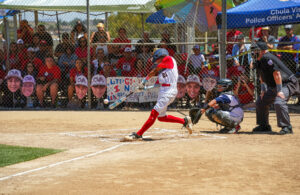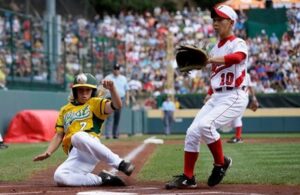Remembering the Manchester Monarchs: In the Beginning
- By Ryan Cowley
- Updated: June 18, 2020

DISCLAIMER: The interviews for this series were conducted in the latter months of 2019.
In May 2019, the Los Angeles Kings and their fans were forced to say goodbye to their long-time minor-league affiliate, the Manchester Monarchs, who had ceased operations. As a result, 2019-20 marked the Kings’ first season in 18 years that the Monarchs were not a part of the organization.
While minor-league clubs relocating or folding may not be uncommon, the Monarchs’ situation is nonetheless a sad time in Kings history but also for fans of the organization. In spite of this chapter closing, though, we can comfortably look back on the history of the Manchester Monarchs and celebrate not only the club’s on-ice success but also its role in preparing so many players for the NHL.
Some players may have had short stints with the Kings while others helped the big club achieve Stanley Cup success. Some worked hard to earn individual awards while others became fan favourites. There were even those who were a part of both the AHL and ECHL versions of the Monarchs as well as some homegrown talent.
In this CaliSports News exclusive, I speak with former members of the Manchester Monarchs family who share with me their experiences both on and off the ice while with the club. For this writer, in particular, though, the memory of the Monarchs holds a special place in my heart — one that goes beyond hockey.
Years before the Monarchs had existed, my family and I would make the seven-hour drive from our home in Ottawa, Ontario, to visit our aunt in Nashua, New Hampshire, just 20 miles south of Manchester. Those spring and fall drives through upstate New York and Vermont en route are, to this day, among my favourite childhood memories. So, when a new hockey team — especially one affiliated with the Los Angeles Kings — was coming to Manchester, this writer had an admittedly difficult time concealing his excitement. After all, I had a new team in this area to cheer for in addition to my beloved Boston Red Sox, who played their home games approximately 45 miles south of Nashua.
In the fall of 2001, a new era began as the Kings’ new AHL affiliate took to the ice, lead by their first-ever captain, Dane Jackson.
“It was humbling,” Jackson said on being the club’s first captain. “All the players just wanted to represent the team well so that the city would be proud of our team. Our leadership group just tried to lead by example. We wanted to play hard on the ice and be positive influences in the community.
“It was a very exciting time in Manchester to be part of the first Monarchs team. There was so much passion in the city for the new organization, so we all felt a real responsibility and pride to play at a high level and represent the team well. The players definitely were energized by the unreal crowds and passionate support on a nightly basis. I know our home record was outstanding and it was directly related to our huge fan base.”
In that inaugural season, Jackson, a native of Castlegar, B.C., would end up scoring 16 goals and adding 21 assists in 76 games for the Monarchs, helping lead his team to an impressive 38-28-11-3 record. This was good enough for second in the AHL’s North Division. Yet, while the Monarchs, led by future NHL coach Bruce Boudreau, would bow out in the opening round of the playoffs, the 2001-02 campaign was undoubtedly an auspicious start for the Kings’ new affiliate.
There was no sophomore slump, however, as the Monarchs followed up their inaugural campaign by finishing second in their division again, amassing 40 wins. Again, unfortunately, the club would lose in the first round of playoffs.
Still, from both a performance and a developmental standpoint, the Monarchs were on the right track. Just as importantly, fans in southern New Hampshire were in love with their team — so much so that some of the Monarchs players received unusual, albeit flattering, requests.
Jared Aulin, who was traded to the Kings in 2001 in the blockbuster deal that sent Rob Blake to the Colorado Avalanche, had an interesting story to share in this vein.
“After games, fans would offer to buy your dinner, buy you a drink or offer anything they felt would benefit us players,” Aulin remembers. “It was a lot of fun to play there because they made us feel at home.”
While his tenure in Manchester lasted just 44 games, Aulin nonetheless has fond recollections of his first stop in professional hockey, emphasizing how dedicated the team’s fans were.
“When I was there, it was a sold out barn all the time,” Aulin continued. “Fans were loud, passionate and proud of us Monarchs.”
Following 17 games with the Kings and a few stops in the AHL, Aulin would enjoy some of his finest years in hockey following 2010 when he took his game to Europe. There, Aulin would spend much of his time between Sweden and Switzerland, maximizing a passion for the sport, which had wavered while in North America. At 38, though, Aulin continues to play, having enjoyed his maiden season in England with the EIHL’s Manchester Storm.
While Aulin was at the beginning of his professional career, though, captain Dane Jackson was at the end of his.
Following the 2002-03 season, Jackson would hang up his skates and move behind the Monarchs bench as an assistant in time for the 2003-04 season to begin. I asked Jackson how the transition went from player to coach as well as who influenced his decision to move into the coaching ranks.
“Bruce Boudreau was the main reason I got into coaching,” Jackson responded. “He was a such a positive leader and always made it fun to come to the rink. He gave me the opportunity to coach in that first year and I learned so much from him and [fellow assistant] Jim Hughes and [Director of Hockey Operations] Hubie McDonough. I did find it difficult at times to transition from being a captain and in the room with the boys to coaching the very next year. As the year went on, I became more comfortable in my new role but there was definitely a transition period.”
After two seasons behind the Monarchs bench, Jackson would make a brief stop with the UHL’s Adirondack Frostbite before joining the University of North Dakota men’s hockey team in 2006 where he still coaches today, first as an assistant and then as an associate coach. But, since his coaching career began in Manchester, it was only appropriate to ask the 49-year-old what some of the most important lessons he learned while with the Monarchs.
“I think the biggest thing I learned in Manchester is that in coaching you need to connect with the players and show them that you care about them as individuals,” Jackson stressed. “If they know that you are genuinely invested in helping them, they will trust you and give everything they have back to the team.”
Another player from the original Monarchs team was Richard Seeley, who is with the Kings organization today. Seeley, who was drafted by the Kings in 1997, would play for the Monarchs during their first three years of existence, serving as an assistant captain before donning the C in 2003.
I asked Seeley what his fondest memories of his time with the AHL’s Monarchs were.
“For me, it was the atmosphere in the building and how well the team was received in the community,” Seeley said. “The fan support was fantastic. There is a long hockey history in New Hampshire and the affinity the fans showed the Monarchs from day one was special– a brand new building and there would be 9,500 fans a game.
“The Monarchs fanbase was fantastic. For the first four to five years, it was one of the highest attendance averages in the league. Just a great atmosphere and building to play in. A great hockey community, a lot of good people, the connections that the players were able to make throughout the community was fun to be a part of.”
Above all else, though, Seeley glowingly remembered just how dedicated fans in Manchester really were, coming out to support their team any chance they had.
“I can remember we would play a lot of three games in three nights, especially in the first year since the building didn’t open till November, we would have 10,000 fans for Friday, Saturday and Sunday home games. That fanbase was a big advantage for us, a fun building to play in. That support went beyond the ice rink as well. The Monarchs Care Foundation would hold several successful community endeavors. One being the Ace Bailey Golf Tournament, which helped raise funds for different causes across throughout the community. So, generally, my experience was definitely a positive one.
“Manchester was a place that I had called home after playing there and I was fortunate enough to meet my wife there, my son was born there, and I just met a lot of great people in the greater New Hampshire community.”
After stints in Bridgeport and Norfolk, Seeley would return to the Monarchs in 2005-06, marking a total of four seasons with the club as a player. But, this would not be the end of Seeley’s time in Manchester as he would return in 2015 to become the ECHL’s version’s GM and head coach. He has since returned to the organization — albeit relocated — as the general manager of the Ontario Reign.
Manchester, like many AHL cities, was the springboard to NHL success for many players.
While it was fairly brief, Cristobal Huet’s NHL career was nonetheless successful. But, before suiting up for the Kings, the netminder would play 30 games for the Monarchs during the 2002-03 campaign.
“Manchester was my first real team in northeastern America,” Huet began. “[Manchester’s Verizon Arena] was full, fans were great and the road trips were even somehow good. We had a great group of guys. It was fun!”
Following his time with the Kings organization, Huet would go on to garner success with the Montreal Canadiens before winning a Stanley Cup in 2010 with the Chicago Blackhawks.
For other players, though, spending time in Manchester was the end result of a demotion.
This was the case for goaltender Jason Labarbera in 2006 when he was sent down from Los Angeles due to waiver issues. A native of Langley, B.C., Labarbera was signed by the Kings the previous summer, going 11-9-2 with a 2.89 goals-against average in 2005-06. But, what looked like a second season with the Kings turned into a return to the AHL where the big netminder had garnered a plethora of success just a few years earlier with the Hartford Wolf Pack. Of course, if playing in Manchester was considered a step down, someone had forgotten to tell Labarbera.
“That was one of the funnest years of hockey I’ve had,” Labarbera told me in an earlier interview. “The one thing that was kind of good about it, in terms of mentality, was that I knew I was going to be [in Manchester] all year, so I knew I had to dig in and really try to improve my game, especially coming off the year before where I was in L.A. the whole year.
“So, at first, it was a bit of a jolt, obviously: to go from the NHL one year to [the AHL] the next year and you’re kind of stuck there. But, we had an awesome team and we got to the conference finals that year. My goaltending partner that year was Barry Brust, who I’m still friends with to this day. He actually lives in Calgary now and I see him quite often in the summers. Our coaching staff was really good with Mark Morris and Scott Pellerin.”
As for the fans in Manchester, well that was just an added incentive for LaBarbera to enjoy his time with the Monarchs.
“One thing back then, too: Manchester, and it’s too bad now because there’s no team there anymore, the fanbase was awesome,” LaBarbera emphasized. “[The Monarchs] had an awesome building and it was a fun place to play. I know that when I was in Hartford always going [to Manchester], it was an awesome atmosphere. It’s sad that there’s no team there now but it was an awesome year for me. I played a lot of hockey that year — I think I played 62 games that year and when you get to play that much hockey, it’s certainly enjoyable but also having success both professionally and personally makes it enjoyable, too.”
Labarbera retired following the 2015-16 season and recently completed his fourth year as the goaltending coach for the WHL‘s Calgary Hitmen.
As thrilling as it may have been having the Monarchs, the fans in Manchester were only getting warmed up for what was in store for their team.
Stay tuned.
Related Posts
About Ryan Cowley
Ryan Cowley has been a sports writer for a number of years having written for various publications, including CBC Sports, about, most notably, hockey and tennis. Ryan runs his own website (est. 2009) dedicated to the NHL's Los Angeles Kings and has covered such events as the Stanley Cup Final, Hockey Hall of Fame Induction Weekend and tennis' Rogers Cup. Ryan was born in St. John's, NL but grew up in Ottawa, ON. Ryan is a graduate of Humber College's Comedy Writing & Performance program and has been living in Toronto since 2009.









